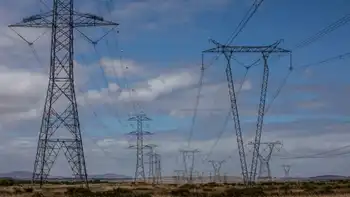FERC buckles under Hill pressure, drops 'SMD' grid plan
By
CSA Z462 Arc Flash Training - Electrical Safety Essentials
Our customized live online or in‑person group training can be delivered to your staff at your location.

- Live Online
- 6 hours Instructor-led
- Group Training Available
FERC Chairman Pat Wood had pinned his legacy to advancing the SMD, a series of rules he said would create a national seamless market for electricity, but critics viewed the reforms as an unprecedented federal power grab and many lawmakers on Capitol Hill spent much of the spring working to spike the plan. That pressure led to a decision this week to announce wholesale revisions before today's electricity title markup in the Senate Energy Committee. Renamed the "wholesale power market platform," Wood said his revamped final order -- due this summer -- will answer many of the doubts advanced most vocally by politicians from the South and West who thought FERC's SMD would jeopardize cheap electricity rates in those regions.
The revisions to Wood's far-reaching reforms were made clear in a highly anticipated white paper called for initially by Senate Energy Committee Chairman Pete Domenici (R-N.M.). The white paper said FERC will not attempt to wrest control over retail transmission from states, nor will the commission try to override state and local governments on questions of transmission resource planning or "native load" service.
Coming on the eve of an electricity title markup in Domenici's committee, sources called Wood's white paper a kind of peace offering meant to soften criticism against the SMD as well as restrain lawmakers from moving to limit FERC's authority. The reversal also speaks to the power of entrenched investor-owned utilities and their lobbyists in Washington who saw the SMD as a serious threat. "I hope the white paper will prove helpful in the debate on regulation of bulk power markets," Wood said. "We will continue to consider carefully the comments of all interested parties as we maintain our comprehensive outreach to the states and other stakeholders."
Wood stressed that the commission will rely on regional state committees to address market design features for their regions while still attempting to ensure that "seams" between regions are minimized. FERC will continue to press for better coordination between regions through formation of regional transmission organizations (RTOs), a concept that has not been well received by consumer advocates but has been accepted by much of the utility industry.
Because "practically all public utilities have voluntarily joined RTOs" or other independent transmission management bodies, the white paper said FERC will direct remaining utilities to join an RTO or other entity in its final wholesale power market platform order. This decision is consistent with Domenici's electricity restructuring title, which does not grant FERC eminent domain over transmission siting and seeks to defer to states "substantial deference" when it comes to RTOs.
FERC also addressed the simmering "native load" controversy on Capitol Hill by saying it will not attempt to require the auctioning off of firm transmission rights. This gives investor-owned utilities, notably in the South, the right to allocate rights to their transmission lines as they see fit, thus protecting native load customers but hurting independent power companies that lobbied for access to power line space to better compete with established utilities.
And regional committees composed of state regulators will have ample room to design markets as they see fit, according to a FERC release on the white paper. Certain core features of RTOs -- including independent grid operation -- will be required, but the regional committees will be allowed to work out timetables and budgets for implementation of congestion management plans and market monitoring rules.
Wood said the new rules, despite the revisions, will still prevent the kind of market meltdown experienced in California in 2000-1. "The core elements of our proposal will combat the type of market flaws that led to the California crisis three years ago," Wood said. "When we have the rules right, customers benefit."
Experts gauge effect on power debate Experts monitoring the congressional electricity debate said Wood's decision may pacify some lawmakers but will not satisfy all since the commission has attempted to strike a middle-ground position on how much authority federal regulators should have over regional grids. The federal vs. state jurisdictional question has been only partially addressed, said Randy Davis, an attorney with Stuntz, Davis and Staffier, leaving some uncertainty heading into the Senate markup. "People should be satisfied, but they won't be," Davis said. "The white paper demonstrated a willingness to address regional concerns that had been expressed with a remarkable degree of flexibility."
Davis expects politicians on both sides of the fight -- pitting those who want more FERC authority against lawmakers who want to erase FERC's ability to intervene in state markets -- will only be partially satisfied. FERC still retains authority over terms and conditions of state transmission under its "just and reasonable" charter, meaning federal regulators can still weigh in on state transmission matters when it views conduct as discriminatory.
"Those hoping for total control for native load are not going to be happy because they didn't get everything they wanted," Davis said. "And those that were looking for one nationwide SMD implemented quickly are going to be unhappy."
A statement released yesterday by one of the SMD's firmest opponents, the Alliance of State Leaders Protecting Electricity Consumers, appeared to confirm how hard it will be for FERC to satisfy interested parties.
"FERC has heard the concerns voiced by numerous parties," said the alliance, which represents state regulators from the South and the West. "But at the end of the day, the landscape remains the same. The reliable and affordable rates enjoyed by consumers in the South and West remain at risk. Congress must reaffirm the states' authority to protect consumers."
Sources from the independent power sector, meantime, essentially said FERC has hung merchant generators out to dry by abandoning auction transmission rights and withdrawing the jurisdiction assertion over bundled retail transmission sales.
"In sum, it is probably better to move along under sub-optimal conditions and solve problems as they are encountered than to continue the unhealthy, counterproductive jurisdictional battle that has characterized the SMD debate," an industry source said.











